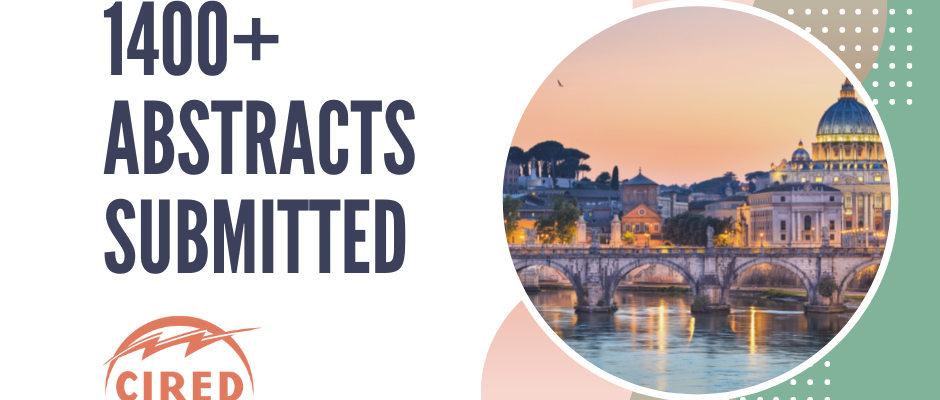Call for Papers
The Call for papers for CIRED 2023 is now closed. Authors will be notified on 14 November 2022. Authors of selected abstracts will be asked to submit a full paper by 23 January, 2023.
The complete Call for Papers is available online.

The Call for papers for CIRED 2023 is now closed. Authors will be notified on 14 November 2022. Authors of selected abstracts will be asked to submit a full paper by 23 January, 2023.
The complete Call for Papers is available online.
SESSION 1 Network Components
SESSION 2 Power Quality & Electromagnetic Compatibility
SESSION 3 Operation
SESSION 4 Protection, Control & Automation
SESSION 5 Planning of Power Distribution Systems
SESSION 6 Customers, Regulation, DSO Business & Risk Management
For more information on the technical session, see our complete Call for Papers.
Session 1 deals with all aspects related to the components used in the electricity distribution networks: cables, overhead lines, primary and secondary substations, transformers, switchgear, protection and monitoring systems, power electronics. It covers topics related to the life cycle of assets from design to end of life management. The session also covers environmental concern including eco-design and life cycle analysis, standardisation, ergonomics and safety. It aims at providing an overview of the state-of-the-art and proposals for future components, including those needed for smart grids, e-mobility, smart cities and microgrids, as well as components for more resilient networks in the context of climate change anticipation. This session is an opportunity for DSOs and manufacturers to share their objectives.
Session 2 deals with any phenomena related to power quality (PQ). This includes e.g. flicker, unbalance, distortion in the frequency range from DC up to 500 kHz as well as events like sags or swells. The session covers also all aspects of electromagnetic compatibility (EMC) including emission, immunity, its coordination and the related standardisation. Conducted and radiated electromagnetic interferences, electric and magnetic fields (EMF) as well as grounding issues are addressed.
Session 3 deals with operational use of components (Session 1) and systems (Session 4) in public, industrial and private distribution networks in normal operation as well as in any case of disturbance.
Session 3 covers all aspects of grid operation including strategies and management topics, challenges and new application, the integration of DER and special applications. Focus is on the use of new technologies like artificial intelligence and the operational challenges to integrate and operate new types of load like electric vehicles and storages.
Session 4 deals with design and implementation of systems for protection, control and automation in distribution networks.
The consideration of historical grown concepts as well as the latest developments in the world of protection, control, communication, and automation are topics in this session. Emphasis is also placed on practical application and experience in operating the systems. But the latest developments, scientific findings and considerations as well as algorithms and simulations are also of great importance.
Session 5 deals with short- and long-term development of high, medium and low voltage distribution networks, concerning the changing requirements for electricity distribution including, but not limited to, smart grids and active distribution networks, electrification and electromobility, energy storage, flexibility, distributed energy resources integration, present and future customer quality of supply requirements, and optimum asset utilisation techniques and strategies. Papers dealing with meeting the energy transition goals, rural electrification, and strategies to increase resiliency are also expected.
The energy transition is impacting the DSO’s business management. The vision to be the enabler of the transition is clear; however, the grid infrastructure is nothing that can be changed over-night. While traditional assets typically have long life-times, new business tools, methods and processes need to be adapted and demonstrated to match new priorities and the necessary speed of transition.
The focus of Session 6 is to take the DSO business perspective including regulation compliance, cooperation with stakeholders including sector integration, reasonable risk management for flexibility and cybersecurity, customer expectation and overall business digitalization.
Prospective authors are invited to submit an abstract of 2 A4 pages (including diagrams and illustrations) by 14 September 2022.
All the papers will be peer reviewed by the Technical Committee and by the National or Liaison Committee of the author’s country, if any.
Successful authors will be invited to submit a full paper by 23 January 2023.
Download the mandatory template and submit your abstract on the submission website before 14 September.
| 14 September 2022 | Abstract submission deadline |
| 14 November 2022 | Notification of acceptance |
| 23 January 2023 | Full paper submission deadline |
| February 2023 | Registrations open |
| 24 April 2023 | Deadline for early bird registration |
| 12-15 June 2023 | CIRED 2023 in Rome |